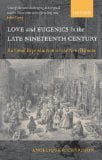 Love and Eugenics in the Late Nineteenth Century: Rational Reproduction and the New Woman
Love and Eugenics in the Late Nineteenth Century: Rational Reproduction and the New Woman
by Angelique Richardson
Oxford University Press, £45, ISBN 0198187009
Nowadays eugenics is a dirty word, calling to mind Nazi experiments and compulsory sterilisation. But a hundred years ago it was a hotly debated topic. There was great concern over perceived racial degeneration in Britain, particularly the prevalence of hereditary diseases and the ill-health and poor physique of large slum families. Eugenicists argued that selective breeding was the answer to both problems. If only the healthiest people bred, the race would improve.
Some commentators argued that any woman wishing to marry should choose the husband most likely to give her healthy children, disregarding such complicating factors as love and sexual attraction. Having as many healthy babies as possible was seen as a woman’s duty and destiny. Fin de siècle feminist writers such as Mona Caird, George Egerton and Sarah Grand took up this debate, exploring the eugenics question in short stories, novels and journalism. Richardson’s book examines these women’s work, exploring ways in which the eugenics debate informed wider debates on the role of women and the nature of marriage. Some of the issues have uncomfortable resonances with today’s arguments about genetic screening and ‘designer babies’. Are we as different from the Victorians as we would like to think?
Chris Willis



